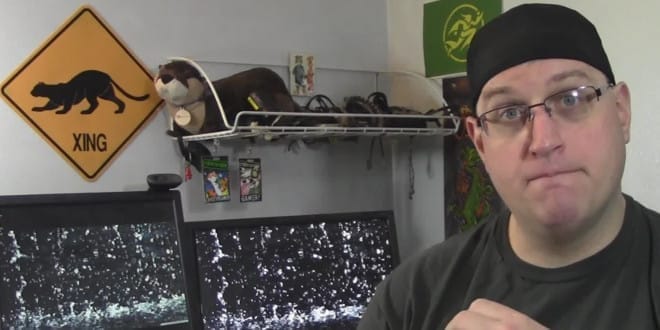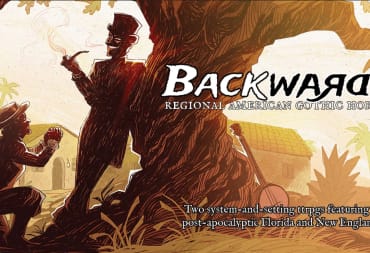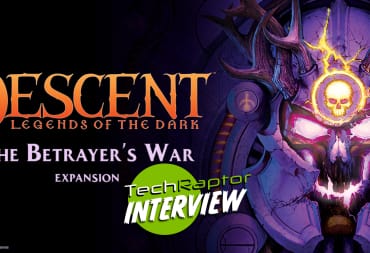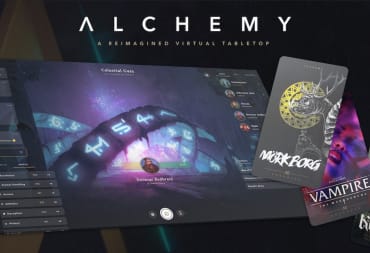A friend of mine gave me a video to look at it, and I followed through with his recommendation. In it, a YouTuber known as Rob "Tyger" Rubin talked about the concept of Smurfing. In his short video, I saw an interesting dialogue on the topic. The video also had hints of doing all the right things when it comes to video production—proper lighting and framing, good editing, opening and end bumpers. It even had a cold open!
It felt a bit like someone with television experience was making YouTube videos. I watched a few more videos and was interested enough in the guy and his ideas that I reached out to Tyger, and he graciously agreed to sit down to an interview. If you want go get a good feel of what Tyger is all about, I would recommend this video of his on smurfing. I found it quite enjoyable. The interview begins after the break.
https://www.youtube.com/watch?v=zaoaPBkbQBk TechRaptor: Tell me who you are and a little bit about yourself—the elevator pitch about who you are and what you do.
Rob "Tyger" Rubin: Hi, my name is Rob Rubin. I'm better known as "Tyger". Currently, I am a video producer. I do videos about video game culture called MUD2MMO among several other different videos that I do. But I think the gaming one is the one you're probably most interested in. The other videos that I do are things like... I do a show talking about MRES and other prepackaged foodstuffs. I maintain a cycling channel now. Not really high-tech stuff.
TR: Who made the intro music for MUD2MMO? It just seemed really nice.
RR: That's a gentleman named Kevin McLeod. If you're familar with Incomptech...
TR: I've heard of it, but I don't remember where.
RR: If you're not familiar with Incomptech, you should be. Incomptech is one of the key resources that any video producer on YouTube should go to. The guy who runs it, his name is Kevin McLeod. The way that it works is that he just [makes available] royalty-free music. There is hundreds and hundreds of hours of music on his site. He basically says, "Yes, you can use my music as long as you give me credit ". Or, you can pay. I think it's like a $30 fee and you can use the music without crediting.
TR: In perpetuity?
RR: Yeah.
TR: That's really generous.
RR: There's a lot of resources that anybody who creates videos on the Internet should have [somewhere in their bookmarks]. Incomptech is one of my number one go-tos because if you need background music, if you need royalty-free music, he is literally the first step.
TR: The reason I asked is that I watch a lot of Youtubers. I don't really watch standard television anymore. So many fail at really basic things like opening credits and an end bumper and things like that. You've got that stuff done. This should be really basic production stuff that [most YouTubers in my experience] don't even bother with. They stop talking and the video just ends.
RR: I'm sort of old school in broadcasting. When I started doing the gaming videos I kind of looked at it as doing miniature broadcasts. I do my show in the same kind of format of a half hour TV show. Opening segment and credits, the main body of the show, end credits and usually a stinger at the end of it. All these things are basically mirroring what broadcast television has done for years.
TR: Well that just answered one of my [later] questions [about] working in journalism & radio.
RR: It's just how I do it. A lot of other shows don't use what is established and works for other media. The format that I'm using for my show - for MUD2MMO - is basically the television format. It's just shrunk down to something a little more YouTube-manageable.
TR: No need to reinvent the wheel.
RR: Exactly. So, you want to put together a show style format. There's a lot of resources that are saying, "Here, use our music." or "Here, use this. All we want is credit."
TR: And of course you could always hire somebody to do [contracted work for music or art]. There's loads of artists that are open for that kind of stuff.
RR: Oh yeah, if you have the money.
TR: Well, some of them are surprisingly cheap. Look at Kevin McLeod. $30, you know? There's a lot of artists that will say, "Hey, I'll do it for free if you just put my name in there" like Kevin McLeod does.
RR: The Incomptech site, what's amazing is that his work is all over YouTube. If you go to his site and you start listening to some of the things, you're like, "Hey, I've heard that on..." Once you hear it once, then your ears are tuned to it.
TR: It's like the Wilhelm Scream?
RR: It's like the Wilhelm Scream, it's like the Amen Break, it's like all these other things where you hear it everywhere and then once somebody points it out to you you go, "Oh, okay."
TR: "Amen break?" I'm not familiar with that.
RR: Somebody did a great - a boring to watch YouTube video but it's a fascinating thing of a drum break called the "Amen Break" which is featured in so many hip hop songs. It's feature in commercials. The Futurama theme uses it.
TR: That stuff aside, you said you worked in journalism and radio. What was that like?
RR: [puts on a stereotypical old man voice] "Well back in the day when I was younger and we all had to ride dinosaurs into the radio station..." Okay, not literally. I used to do radio work. I used to work in broadcast television. What I did in television [was] something called "Master Control". If you've ever seen footage from the TV stations of some people sitting in a dark room and there's like a gazillion TVs in front of them, that's what I did. I was the guy who was making television work.
TR: Push the button to switch to a different camera and stuff like that?
RR: Stuff like that, yeah. Although the station I was working at, we didn't have a live studio. We had beta tapes. [laughs] We had walls of beta tapes and we had beta controllers.

TR: Betamax?
RR: Yea
TR: Please take the following question in the most respectful tone possible, but how old are you if you don't mind my asking?
RR: I'm 44.
TR: Wow, okay. So good genes there. I would have pegged you at early 30s at the oldest.
RR: [in his best Macho Man Randy Savage impression] OH YEAH! You have no idea how much I go through to try to not look 44 on camera.
TR: [I'm 29] and [sometimes] people tell me, "Oh dude, you gotta be like 40,". Like, wow, thanks...
RR: [laughs]
TR: So that's great to hear...
RR: Anytime you're doing videos it's about relating to the audience. One of the things that I find is that if you're older and you're talking down to your audience it doesn't work. I'm talking with the audience. I go out of my way to not look like an authoritarian figure. And it would be really easy to do if I wanted to look authoritarian. I just don't.
TR: Tilt the camera up a little bit?
RR: That's one way. How you dress, how you handle yourself, tilt the camera up a little bit. I could change the lighting. I could not sit in front of the computer. A lot of different things.
TR: So you actually put a surprising amount of thought in all these little things that seems to a casual viewer as off-the-cuff filming [in a room with no thought put into the setup].
RR: Oh yeah. It's funny that you talk about that. I've seen a lot of videos way back when I first got started over on when the site was stilled called That Guy With The Glasses. There's a forum thread called "Rate The Video Above Yours". It was kind of a way that you could put your video out there and have someone else critique it. Some people will take that sentence in the wrong way and get all defensive. There was only a few people who would give you actual critique. Whenever I could get one of those people to give me critique I prized that and I would take what they said and I would incorporate it. Maybe not fully because sometimes you can't, but anytime that somebody would give me advice I would fully embrace it. If you want your show to look good, if you want your videos to look good, you have to listen to the advice that you don't want. You have to listen to the people who are like, "This show sucks." You have to listen to these things. Because those are the people who are going to inadvertantly or purposefully help you. I've been putting a lot of thought into these things. Even if you don't have a lot of resources you can take a few minutes and go, "Okay, what's the best setup for what I've got?"
TR: In my research, I found your video on smurfing really interesting. I like the analogy of how you brought paintball into it—about how there'd be open play days where a whole bunch of people would get together to play and the skill of your teammates was really up in the air. In your video, you mainly talked about pickup games and open play—non-competitive [environments]. But, smurfing does still happen in more competitive environments, such as the ladder in Starcraft II and MOBAs. Have you ever see that happen in paintball where a ringer was brought into a lower-skill level match?
RR: Oh, all the time.
TR: How do you feel about [bringing] in a higher-skill player into a lower-skill setting within the context of gaming?
RR: In paintball it happened all the time. There's actually a lot of people who do sandbagging. Depending on league rules - I can think of one league rule in particular - [you can have] four people who have never played a tournament before and then one person who has played [professionally]. Because that's the way the rules were written. I personally don't like it, but on the other hand somebody along the way said, "Yes, this is a good idea." In all honesty, there's nothing stopping people from doing things like that unless the rules are written to stop them. Personally, I wouldn't do it but that's me and I'm weird. But hey, as long as you're winning, who cares, right? I roll my eyes as I say that.
TR: How did you get involved in making gaming videos for YouTube?
RR: I've been gaming. That's sounds really basic, but... I was doing [paintball] videos and was not really enjoying the whole paintball thing anymore. I was kinda like, "Okay, I still want to make videos - where can I go from here?" So I started looking into other things that I was doing that I would be interested in doing commentary on. At the time there were a lot of people doing video game stuff but everybody was doing reviews of the latest and greatest producst. I was looking at it and going, "You know, nobody's really talking about what's going on socially." Nobody's really addressing the 800 pound elephant in the room. I started doing culture-based shows. For me, it was just kind of a progression - paintball's kind of dead-ending over here, where's gaming going? Well, let's take a look at this. And I've been pursuing that ever since.
TR: What is the first game you ever recall playing?
RR: Pong.
TR: Pong. So you go way back.
RR: I'm actually kind of being serious about that. The first video game I can recall playing was a Pong machine. It was in some random restaurant that I don't even remember the name of. My parents took me [and the rest of the family and the restaurant] had a Pong machine. It was sort of a novelty. I can also remember going to a pizza place and they had - I wouldn't call it a video game, but it was called Skeet Shooting, cost twenty-five cents to play and there was a big board on the wall that had lights that would flash. You had to push a button in order to make the hunter at the bottom shoot the skeet at the right time as the lights were moving across the board.
TR: And in the idea of "nothing new under the sun," I believe there's a really popular arcade game where [buttons light up] and you have to try to push them as they light up as fast as possible. So that's still a thing that happens. It's all whack-a-mole, basically.
RR: Kind of, except that you could anticipate where the mole was coming [from].
TR: I'm sure if you back hundreds of years they probably had a bunch of kittens in a box and they handed you a club.
RR: [laughs]
TR: "Doth thou smash three, win two shillings!"
RR: Nooooo! No! We don't smash kittens! No!
TR: No, of course not. It'd be a terrible thing to do. [laughs] Neither TechRaptor nor the author supports animal abuse in any fashion despite my previous joke. [Back] to the subject of gaming—what would you consider your favorite game of all time?
RR: My favorite-ist game ever is the Ratchet & Clank series. Matter of fact, for Extra Life this year I did a playthrough of the first Ratchet & Clank game from the original PS2.

TR: Do you have a game that you're really excited to play but you just haven't gotten around to it for one reason or another? New or old.
RR: A couple of them.
TR: Like anything stand out if someone said, "Hey, so you have the entire day off. You can play anything you want. If you don't own it, [I'll] buy it for you." What's the first thing that comes to mind.
RR: [sighs] That depends, are they gonna buy me a new computer so that I can play this? [laughs]
TR: [laughs] Let's just say yeah. Irrespective of your setup.
RR: Um, oh wow. If I could play anything right now... gosh, I don't know. The easy answer is Fallout 4 because everybody else is playing Fallout 4 right now.
TR: Alright, so Fallout 4 you would say.
RR: The only reason I would want to play Fallout 4 is because everybody else is playing Fallout 4 and I can't.
TR: [I can understand - my YouTube sub box and my Steam friends list was just Fallout 4, Fallout 4, Fallout 4.]
RR: I'm actually kind of beginning to wonder. I've been wanting to do a show about the Let's Play community. Is it even worth buying and playing video games [like Fallout 4] because within minutes of it being released people are already doing livestreams. People are doing walkthroughs [and] Lets Plays. In theory, you don't even have to play a game anymore.
TR: Sure, I would say it absolutely is because gaming's an interactive medium and you can't interact with it when you're watching somebody. I watched a couple YouTubers who were doing a lot of [Fallout 4] stuff. As you know, [YouTubers often] tend to go with popular trends, and they would do stuff and I'm like, "No, no! You missed that! Turn around! Go pick that up! That building is way more interesting than the one you're going into! What are you doing?! Oh god!"
RR: Yeah, I'm presenting things just for the sake of argument which is what I like to do on the show. Even if it's completely wrong it's worth exploring as an idea.
TR: Absolutely. I would absolutely agree with that. That's the kind of mindset probably only a journalist would have. It's the willingness to explore something even if its wrong. That's why they interview really crazy people sometimes.
RR: Oh, and just to complete the thought here - I just opened up my Steam library of games that I have and haven't played. There's a lot. [laughs]
TR: Oh, I understand. [laughs] So, do you think it's at all possible to design gameplay that incentivizes good behavior in a way that can't really be abused? Because you talked about that in your PUG video where you [talked about] how the system works. [You also talked about DC Universe Online] where people would abuse systems like kicking, which is really there to prevent people from ruining [gameplay]. There's the story of—I think it was in India—where the British were paying a bounty for people to bring them dead rats because there was a rat problem. It's called a "perverse incentive." What ended up happening is people would capture rats, breed them, and then kill them and it actually made the rat problem worse. So, something like that where a mechanic is intended to do one thing but [due to the] law of unintended consequences it does something entirely different or makes some other terrible thing available.
RR: I can see solutions. Problem is like you said, they will be turned into something bad. You can not enforce morality. There are hundreds and hundreds of socieities...
TR: That have tried and failed?
RR: History is littered with the remains of societies that failed to enforce morality. You can't make people do what they're not prepared to do anyway. I don't think there's a system that you can put into place. If somebody comes up with one they will be heralded as genuises.
TR: Your end bumper has "Keep Circulating The Tapes" on it. I've heard this before. This question is a little bit for me and a little bit for our readers, what does "Keep Circulating The Tapes" mean and more importantly why do you include it in every end bumper as far as you can tell?
RR: Well, number one, it is my constant nod to [Mystery Science Theatre 3000]. Have you ever watched it?
TR: I've seen a couple episodes.
RR: At the end of every episode they include in the credits "Keep Circulating The Tapes".
TR: So is that the direct reason why?
RR: No. Well, it's one of the reasons, but it actually harkens way far back. Back in the old days before there was such a thing as Internet...
TR: Yeah, people would pass around [bootleg] VHSes. The classic example is the Star Wars Holiday Special.
RR: Yes. Where people would lovingly take two VHS machines and they would link them together and then they would hit play on one and record on the other. They would sit there for an hour waiting for the video to transfer so that they could hand a physical copy of the tape to somebody else.
TR: Back when piracy took work!
RR: Yeah, there were ways around that too. There were a lot of people way back in the '80s - the only reason that some anime made it to Chicago was because it was copied one copy at a time across the country from California.
TR: Well, the only reason Crunchyroll exists is because anime was pirated online shamelessly for over a decade.
RR: Yeah, but I'm talking way back in the '80s. If you wanted to watch The Dirty Pair you were watching a 100th, 150th generation copy on this really crappy old television because that was the tape. That was the tape that you got.
TR: That was the only one you could get. You couldn't even buy it legally.
RR: No. It didn't exist in America. A lot of the things that I do are throwbacks to the old days. In my closing credits I include a test pattern and the end of the Star Spangled Banner, because thats how TV stations would sign off at the end of the night back in the day. A lot of people tend to forget how we got to where we are now. They just kind of take it for granted that, "Oh, YouTube is just a thing so if you want to jump online you can listen to this music, you can watch this show, whatever." Way back when, you couldn't do that. You had to know a guy who knew a guy who knew somebody who happened to go to Japan.
TR: That's one of the things that really strikes me about how underappreciated the Internet is. There's this comic that's like, "Man, who was in that movie?" and it used to be like, "I don't know." and that's where the conversation ended. Or you'd call Jerry—the guy who watched every movie ever—and he would tell you because he knew everything.
RR: Or you'd go to the encyclopedia. The physical encyclopedia.
TR: If you had one. Because those were like $250 or more. That's something that's literally been wiped out of our culture now. There's no more, "Hey, how does this work or why does that work"? There's an [open-heart] surgery tutorial on YouTube! I wouldn't recommend you go and try and do it and practice unlicensed medicine, but if the situation ever came around [where you wanted to learn how to do open-heart surgery] you can just go and- it's right there! It's at that level now!
RR: If you wanted to find something out. You had to go to the library. You had to go someplace else.
TR: And if they didn't have the book they'd have to order it for you from another branch or sometimes another state.
RR: These are things that people tend to forget which is one of the reasons that I do what I do in the show. "Keep Circulating The Tapes" is still that nod of, "Hey, remember where we've been. Those who do not know their history are doomed to repeat it." Although I don't think that's gonna happen anymore with things like video it's still good to know that's [how it used to be]. Hell, before YouTube the paintball shows that I used to do... I used to host those privately on a site. It was all cool until the ISP was bought by another company and then they informed me that I had gone over my bandwidth in 12 hours.
TR: Ouch.
RR: And then when that happened, we quickly formed a peer-to-peer sharing group so that we could share Windows Media Video files between all of the fans of the show.
TR: So kind of like a proto-Bittorrent?
RR: Yeah. When I put [Keep Circulating The Tapes] in the video it's not just there as decoration. It's kind of a, "Hey, remember this happened."
TR: The only thing I have left to bring up is if there's any specific message you want to get out to our [readership]. Anything you want to add on?
RR: If I had any message to tell [an audience]... I'm trying to think if I have anything that's really profound and I don't.
TR: [laughs] It doesn't have to be profound.
RR: Well, you know, usually closing thoughts are the zingers that make people go, "Oh, hey, this guy's intelligent. Maybe I should watch his show." But I'm just an idiot with a YouTube channel.
TR: [laughs] That's perfect! There we go!
RR: Just... give things a chance. I would like to tell people... if you're reading this interview and going, "God, this guy's an idiot" at least give the show a shot. If you like it, it's cool. If you don't like it, eh, it's ten minutes of your life. What else are gonna do for ten minutes?
I would like to thank Tyger for sparing some of his time to talk with me. He stuck around a bit longer, and we had a rather pleasant chat for a few hours off the record. I would also like to state my appreciation for his extraordinary patience and consideration—I've been feeling ill lately and this interview has had to sit on the back burner for a while while I recover.
On March 18th, 2016, Tyger went to a local medical clinic feeling a bit ill and soon discovered that he had undiagnosed Type 2 Diabetes thanks to a blood suger level twice as high as what should have put him in a coma. Aside from making many changes in his life, he has decided to devote his cycling enthusiasm and time to the Amercian Diabetes Association's Tour De Cure. You can contribute to his fundraising efforts here.
As he said in the outset of the interview, Tyger has multiple channels devoted to different subjects: MUD2MMO for video games (and a Facebook Page), PrePackShow (Facebook Page) for MREs & prepackaged foods, and the River Otter Cycling Club (Facebook Page) for his cycling endeavors. You can also find him streaming regularly on Twitch and support his work via Patreon if you feel so inclined.
What do you think of the application of traditional television editing & production techniques as applied to new media? Do you feel that YouTubers as a whole could do a better job with production quality on YouTube or are they leaving behind the cruft of old media? Let us know in the comments below!
Have a tip, or want to point out something we missed? Leave a Comment or e-mail us at tips@techraptor.net












